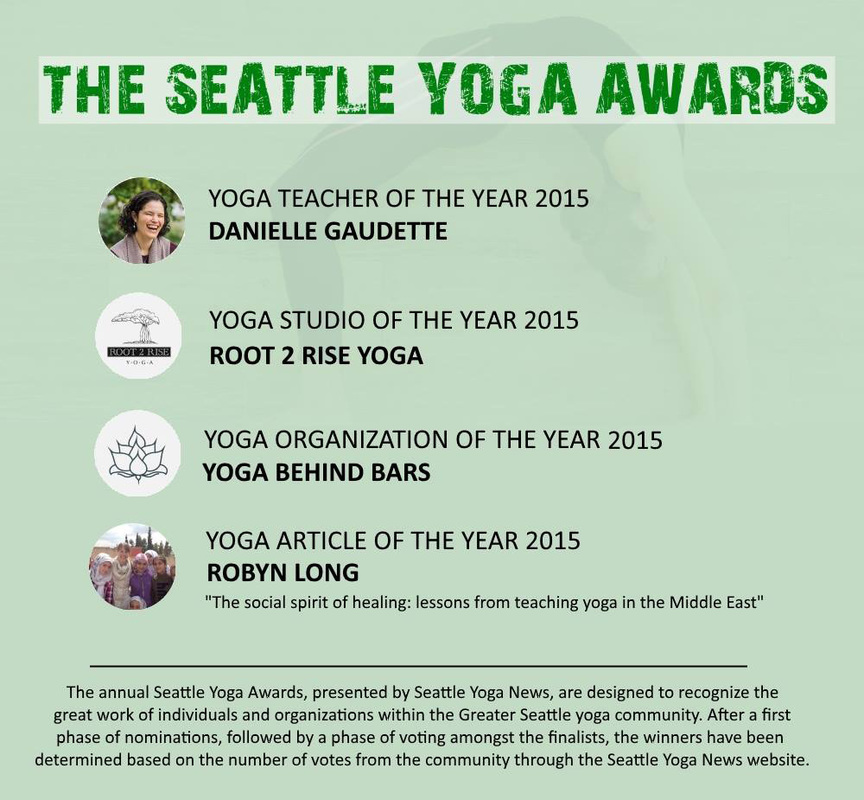|
This article originally appeared in Seattle Yoga News.
This summer, the Center for Child and Family Well-Being (CCFW) at the University of Washington (UW) is piloting a mindfulness-childbirth education program for pregnant women who have experienced sexual abuse or assault. We talked with CCFW staff and the study’s interdisciplinary team to learn more about this research. Joining us for the discussion is:
The mindfulness-childbirth education study will explore how providing support to women through self-care strategies can help them manage stress in times of potential adversity. This is an important research area since women who have experienced sexual trauma might experience additional challenges such as distress and depression during their pregnancy and after their give birth to their babies. Research shows that parental stress can play a role in children’s social, emotional, and behavioral adjustment. This study looks at how to improve the well-being of mothers-to-be, which can in turn improve health outcomes for their children. Q2: Can you share an overview of the study’s objectives and protocol? What brought your team together to embark on this research?Cynthia: This study is designed to provide pregnant women with a history of sexual trauma with mindfulness skills within the context of a childbirth education program, to help support them as they prepare for delivery and parenting. “Mindfulness-Based Childbirth and Parenting” (MBCP) is a program developed by midwife Nancy Bardacke. The objective of this study is to examine the feasibility and acceptability of a modified trauma-informed approach to mindfulness for childbirth education. To examine feasibility and acceptability we’ll ask participants for their feedback related to the class structure and content. We will also look at their responses to self-report health questionnaires related to anxiety, depression and coping skills to provide insight on the potential benefits of the program. This study begins in mid-June so we’re seeking study volunteers now! Q3: How will you bring mindfulness into childbirth education? Can you give an example of something participants might learn?Becca: The foundation of this class are mindfulness skills, which are taught through practices such as awareness of breathing meditation, mindful eating, and mindful movement (e.g. gentle yoga and walking meditation). Using this lens of mindfulness, we discuss topics covered in typical childbirth education classes including: the stages of labor, positions for ease in labor, skills for coping with pain and fear, and suggestions for communicating well with providers. In these discussions, special attention is paid to how being aware of one’s present moment experience – sensations, thoughts, emotions – can support a sense of ease even when facing the challenges of childbirth. By bringing present moment awareness to the realm of childbirth, women are able to see their expectations, hopes and fears more clearly. This allows them to develop plans for support and coping that speak directly to their own experiences. After taking the MBCP class, many students report feeling more calm and confident that they have the skills to cope well with labor and early parenting, however it may unfold for them. Q4: What are some of the adaptations you’ve made to make the mindfulness program supportive to women with a history of sexual trauma? Cynthia: We have expanded the program to include three coaching sessions, delivered individually vs. in a group, to focus on mindful body awareness. Women with histories of sexual trauma can find it challenging to connect to their bodies because many of the coping strategies for trauma involve avoidance of bodily sensations. Attending to sensations in the body (e.g. breath) is integral to mindfulness. The one-on-one sessions are designed to provide individualized coaching to facilitate learning how to bring mindful attention into the body, to practice this in daily life, and to use in response to stressful situations to facilitate regulation. In addition, the childbirth education classes will include more explicit discussion of how to prepare and cope with anxieties related to delivery and parenting that may stem from past traumatic experiences. Q5: How might mindfulness skills support women during labor? Ira: Labor and birth are intense experiences that involve physical sensations, strong emotions, and intimacy. Even under ideal circumstances the maelstrom of sensations can be overwhelming. Women with histories of sexual abuse or trauma may fear the childbirth experience because it may trigger memories of their abuse. I have cared for women who would rather give birth by cesarean than face these sensations. Mindfulness skills have the potential to help women face the physical sensations and the emotions they evoke without feeling overwhelmed. This has the potential for turning the labor and birth into an empowering and life-changing experience which allows them to develop an improved relationship with their physical bodies. Q6: How will you involve participants’ support persons? Why is it important to engage them in this program?Becca: Support people are encouraged to attend and will be invited to fully participate in class activities and discussions along with the pregnant women. There are exercises in the class which focus specifically on teaching hands on support techniques that can be helpful in labor and opportunities for the pregnant women to share which techniques work well for them. Opening this communication for the women to share what is helpful and what is not lays the ground work for supportive communication during the birth process. In addition to being valuable for labor and birth, the mindfulness skills that are taught are useful for coping with many aspects of life – work stress, family and relationship challenges, and changes associated with having a baby. Support people often find the class teachings to be valuable over and above what it offers to them in their role as birth support. Q7: How much research has already been done in this specific field?Cynthia: To our knowledge there has been no prior research on mindfulness in childbirth education for women with trauma histories. There is considerable research evidence that a history of sexual trauma is a risk factor for prenatal anxiety and depression, putting women at risk for post-partum depression and poorer maternal and child health [1, 2]. Research studies also show that anxiety and depression can be improved during pregnancy and that such improvement may have a positive impact on obstetric outcomes as well as maternal and child health [2]. There is substantial research to show that mindfulness interventions reduce anxiety and depression [3]; mindfulness studies for pregnant women also shows reductions in anxiety and depression but with fewer studies to clearly show efficacy [4]. Together the research in these areas suggests that providing mindfulness skills for pregnant women who have a trauma history may be a useful approach to improve obstetric, maternal and child health. Q8: How might findings from this research lead to improved care for women during labor? Ira: Helping laboring women stay focused on the present can reduce the fear of childbirth and emotional pain of past memories of abuse. Staying mindful during the minutes between contractions allows the woman to take advantage of the natural rest periods during labor to rejuvenate and conserve strength for the next contraction. Our research has the potential to show that the mindfulness approach can help women with histories of sexual trauma and catalyze a positive relationship with her embodied sensations. Even if a woman chooses not to share her history of sexual abuse with her provider, she may find the mindfulness skills helpful as she focuses inward during labor and birth. When she does share her past history of abuse, the provider can facilitate her journey through providing an environment that supports the mindfulness approach. This can include reducing the distractions in the labor and birth room and gently reminding the laboring woman to remain focused on the present. Q9: How will this study contribute to future research and programs at CCFW?Robyn: This study addresses a gap between mindfulness, prenatal care, and trauma research. The research team brings together an incredible amount of knowledge and practice experience in these fields. They are well poised to adapt and assess a mindfulness program for women during this important period of life. This research will provide CCFW with information and insights necessary to embark on a larger study that explores how to effectively support women with a history of trauma during and after pregnancy. Ultimately, we anticipate that this research will have implications for trauma-informed mindfulness programs as well as prenatal care. More Information Interested in participating in the study? Contact Anna Treadway, Research Coordinator, at 206.616.6423 [email protected]. Interested in more information about the Center for Child and Family Well-Being? Visit our website at www.depts.washington.edu/ccfwb or email Robyn at [email protected]. References 1. Yim, I., Stapleton, L, Guardino, C., Hahn-Holbrook, J., Schetter, C. 2015. Biolobical and Psychosocial Predictors of Postpartum Depression: Systematic Review and Call for Integration. The Annual Review of Clinical Psychology, 11: 99-137. 2. Martini, J., Petzoldt, J., Einsle, F., Beesdo-Baum, K., Hofler, M., Wittchen, H. 2015. Risk Factors and course patterns of anxiety and depressive disorders during pregnancy and after delivery: A prospective-longitudinal study. Journal of Affective Disorders, 175: 385-395. 3. Gu J, Strauss C, Bond R, Cavanagh K. How do mindfulness-based cognitive therapy and mindfulness based stress reduction improve mental health and wellbeing? A systematic review and meta-analysis of mediation studies. Clinical Psychology Review. 2015; 37(1–12). 4. Taylor, B., Cavanaugh, K., Strauss, C. (2016). The Effectiveness of Mindfulness-Based Interventions in the Perinatal Period: A Systematic Review and Meta-Analysis. PLOSone, 11 (5): e0155720.
0 Comments
|
It is a tremendous honor that my article on sharing yoga with Syrians won "Yoga Article of the Year" in Seattle Yoga News. Endless gratitude to everyone who was part of and supported this inspiring project.
Archives
July 2017
Categories
All
|


 RSS Feed
RSS Feed